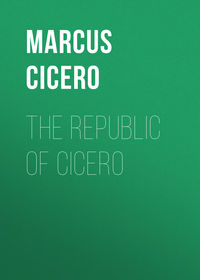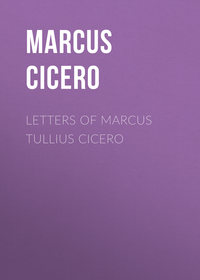 полная версия
полная версияThe Letters of Cicero, Volume 1
709
Reading at tu non soles. I cannot explain Prof. Tyrrell's reading et tu soles in connexion with what follows.
710
This elaborate joke is founded on a pun upon the name of the Gallic Treviri and the commissioners in Rome: (1) the III viri capitales, who had charge of prisons, executions, etc.; (2) the III viri auro argento æri flando feriundo, "the commissioners for coining gold, silver, and bronze." Also there is a reference to the meaning of capitalis, "deadly," "affecting the life or citizenship."
711
Græculam tibi misi cautionem chirographi mei. Various interpretations have been given to this: (1) "a truly Greek security," i.e., "not to be depended on"; (2) referring to a poem in Greek, perhaps the one in praise of Cæsar's achievements, mentioned before (p. 338), in which some compliment to Trebatius was introduced; (3) Prof. Tyrrell would make it refer to this letter itself, which he supposes to have been written in Greek, and afterwards translated by Tiro. But this letter does not read like a translation, and, after all, is not of a nature to shew as a "commendation." It is conceived in too jocular a vein. I have taken it to refer to some inclosure written in Greek which he might use in this way, and the mention of his "own handwriting" to refer to the fact that he would naturally have employed a Greek secretary to write Greek. The diminutive Græculam I take to be apologetic for the Greek. But it is not at all certain.
712
On his journey along the via Appia to one of his seaside villas Cicero has put up at a friend's house (a freedman of Lepidus), near the Pomptine marshes, as was his wont (Att. vii. 5). It was near Ulubræ, of which he was deputy patronus in the absence of Trebatius, and he jestingly pretends that the frogs which he hears croaking in the marshes are frogs of Ulubræ turning out to do him honour, as though they were the citizens of the town. Ulubræ was a very dull and decaying town.
713
The great rising in Gaul in b.c. S4-53, and the second expedition across the Rhine.
714
The friendship between Trebatius and Matius remained as long as we know anything about them. Cicero afterwards acknowledges (F. ii. 27) the great services Matius had done him with Cæsar, to whom Matius remained attached to the end.
715
In these vague though ominous sentences Cicero is referring to the constant and violent hindrances to the election of magistrates, that is, to the orderly working of the constitution, which were occurring. No consuls were elected till September.
716
Milo. His full name is T. Annius Milo Papianus; originally of the gens Papia, he had been adopted by his maternal grandfather, T. Annius.
717
Pompey was præfectus annonæ b.c. 57-52. As such he had a number of legati, of whom this Titus Titius was one; but there is nothing to shew in which of the corn-supplying countries he was employed. Avianius is a corn merchant, and wants concessions as to the importation of his cargoes.
718
The letter in some MSS. is inscribed to Sextius or Sestius. Of P. Sittius of Nuceria we hear in the speech pro Sulla, §§ 56, 58. Sulla (who was accused of assisting Catiline) had sent P. Sittius on a mission to Spain, as it was alleged, to raise a rebellion there in support of Catiline. It does not, however, appear that his condemnation took place then. It seems to have been just previous to Cicero's return from exile (August, b.c. 57), and it is suggested that it was after his ædileship of the previous year, when a scarcity of corn had contributed to his unpopularity. The date of the letter is uncertain.
719
P. Sulla. Sittius was not, it seems, brought to trial with Sulla, but his journey to Spain formed part of the allegations against Sulla.
720
Titus Fadius Gallus had been a quæstor in Cicero's consulship (b.c. 63), and a tribune in b.c. 58, when Cicero reckoned him among those on whom he depended to resist Clodius. He also, among others, had a motion prepared for Cicero's recall, of which Cicero speaks with approbation (p. 178). We do not know on what charge he had been condemned, but a number of prosecutions followed the death of Clodius and Pompey's legislation as to violence and corruption of juries.
721
Pompey. He uses the word potentia, as he generally does, in an invidious sense of "tyrannical, or, unconstitutional power," as opposed to auctoritas, "legitimate influence."
722
Brother of Cicero's enemy, P. Clodius. He had been consul in b.c. 54, and was now proconsul in Cilicia, in which government Cicero was to succeed him. His relations with Cicero had been varied, and though Cicero speaks warmly to him, he does not do so often of him, and his compliments are evidently not really sincere.
723
"I shall, in compliment to your accomplishments, call the goddess of learning and wisdom 'Appias,'" i.e., the "Appian Goddess." But the meaning of the elaborate and dull joke or compliment is far from clear, especially the phrase si forte de tuis sumpsero. Was Cicero expecting a present of a bust of Minerva, or intending to purchase one from Appius's collection? Or does he allude, as has been suggested, to the Minerva he had himself dedicated before his exile, and which had probably fallen into the hands of the Appian family?
724
The condemnation of T. Munatius Plancus Bursa, who, being tribune in b.c. 52, had promoted the riots following the death of Clodius, especially in regard to burning his body in the Curia, and had, after his office terminated (10th December), been prosecuted de vi by Cicero successfully. Bursa, with others, had supported Pompey's wish for the dictatorship, as well as his legislation, and accordingly, in attacking him, Cicero had against him the weight of Pompey's influence. He therefore looks upon it as a great triumph.
725
The condemnation of Bursa was a point in favour of Milo, whereas Milo's murder of Clodius only brought his ultimate condemnation and exile. Milo's trial had taken place in April.
726
Pompey and his friends.
727
The new laws introduced by Pompey de vi, de magistratibus, de pecunia ob iudicium.
728
The intercalary month was inserted between the 23rd and 24th of February. Whether it was to be inserted or not depended on the pontifices, who kept their secret jealously. If it is inserted, Cicero will be kept all the longer in town with senatorial and legal business, and so be prevented from seeing Marius, who lived near his Pompeian villa.
729
It is to be observed that at this time Pompey is reckoned as inclined to the populares. His legislation in b.c. 70 had been somewhat in their favour; but he had not, as a fact, ever declared himself either way.
730
C. Antonius, impeached by Cæsar for plundering Macedonia, appellavit tribunos iuravitque se forum eiurare, quod æquo iure uti non posset (Ascon. § 84). His offences in Macedonia, where he had been left by Sulla, were in b.c. 83-80; his impeachment, b.c. 76; his expulsion from the senate, b.c. 70.
731
M. Marius Gratidianus (Ascon. § 84). These denunciations of Antonius and Catiline seem to be taken from the oration in toga candida.
732
Cælius, consul b.c. 94 with Cn. Domitius Ahenobarbus.
733
Cicero, of course, was now a senator, but he was the first of his family who had been so. The others who came forward for the consulship were two patricians, P. Sulpicius Galba, L. Sergius Catilina; four plebeians, C. Antonius, L. Cassius Longinus, whom Asconius calls nobiles, i.e., members of families who had held curule office; and Q. Cornificius and C. Licinius Sacerdos, whose families had only recently risen to this position, tantum non primi ex familiis suis magistratum adepti erant (Asc.)
734
He hints, I think, at Cæsar, who supported Antonius and Catiline, and also the Luculli, who were opponents of Pompey.
735
C. Fundanius, defended by Cicero b.c. 66, fr. p. 216. Q. Gallius, defended by Cicero on ambitus b.c. 64, fr. p. 217 (Brut. § 277). C. Cornelius, quæstor of Pompey, tr. pl. b.c. 67, defended by Cicero b.c. 65 (Ascon. § 56 seq.) C. Orchivius, Cicero's colleague in prætorship b.c. 66 (Or. § 160). We don't know on what charge Cicero defended him. The passage in pro Cluent. § 147, does not mean that he was accused of peculatus, but that he presided over trials of peculatus as prætor.
736
Manilius, tr. pl. b.c. 66, proposed the law for appointing Pompey to supersede Lucullus in the East. After his year of office he was accused of maiestas, and later on of repetundæ, but apparently neither case came on. C. Cornelius, tr. pl. b.c. 57, was accused of maiestas in b.c. 55, and defended by Cicero. He had become alienated from the senate by its opposition to his legislation against usury in the provinces, and the case made a great sensation.
737
From fio, according to Cicero, credamusque quia "fiat" quod dictum est, appellatam fidem (de Off. i. § 23). He is referring to his promise to emancipate Tiro on a particular day.









